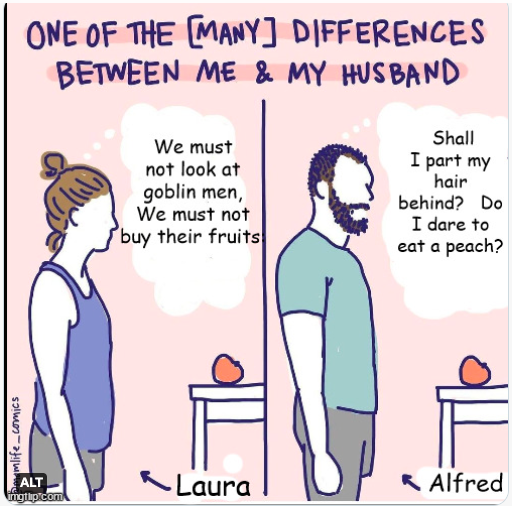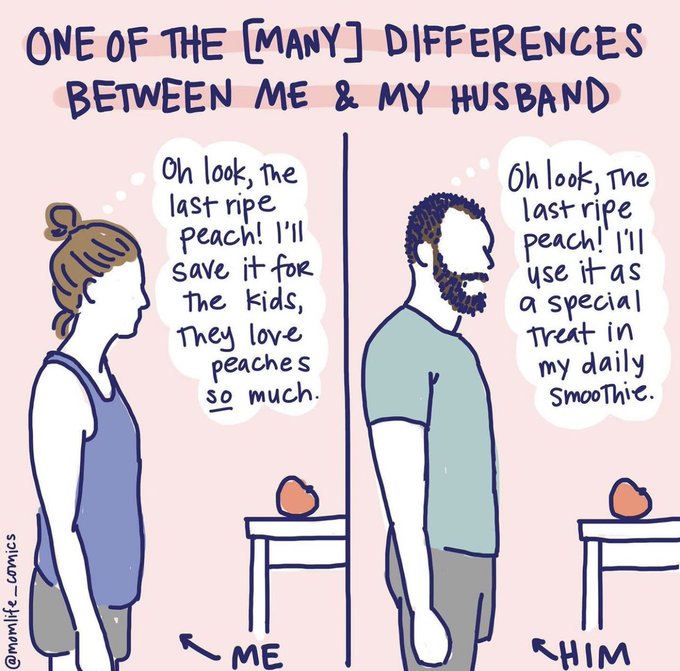Wednesday
Periodically I share comic tweets from my youngest son’s twitter feed because I find them to be hilarious. The above image is Toby repurposing an image (or meme) that has been bouncing around the twitterverse. If you don’t pick up on the literary allusions, I explain them below.
In posting it, I’ve given you the punchline without the set-up. Since the joke in such twitter humor lies in how successfully one hijacks the original image for one’s own purposes, here’s the original image so that you can compare:
The original drew a lot of twitter criticism because it trades in stale gender stereotypes of women caring for others and men caring only for themselves. Furthermore, the cartoonist’s sense of women’s moral superiority rubbed a number of readers, not only men, the wrong way. The two figures have essentially been reduced to caricatures.
Toby’s repurposing not only makes the cartoon funnier—at least for literature nerds—but more complex. The woman’s new response (as I’m sure many of you know) references Christina Rossetti’s Goblin Market, the man’s T.S. Eliot’s Love Song of J. Alfred Prufrock.
Rossetti’s poem is a wild phantasmagoria involving forbidden fruit, which is a stand-in for (I simplify here) casting off all sexual restraint. Its fairy tale mysteriousness makes it one of my all-time favorite poems. Here’s are “the goblin men” tempting Laura and her sister:
Morning and evening
Maids heard the goblins cry:
“Come buy our orchard fruits,
Come buy, come buy:
Apples and quinces,
Lemons and oranges,
Plump unpecked cherries
Melons and raspberries,
Bloom-down-cheeked peaches,
Swart-headed mulberries,
Wild free-born cranberries,
Crab-apples, dewberries,
Pine-apples, blackberries,
Apricots, strawberries–
All ripe together
In summer weather—
Laura gives in to temptation, buys, indulges, and then loses all joy in life. Fortunately, her sister—who heroically resists goblin temptation—sacrifices herself, thereby saving Laura. The poem is a rich exploration of sexual repression and sublimation.
In Eliot’s poem, meanwhile, the socially insecure and uptight Prufrock, attempting always to be perfectly proper, occasionally imagines (but does no more than imagine) taking a daring action. One of these actions involves eating a peach:
Shall I part my hair behind? Do I dare to eat a peach?
I shall wear white flannel trousers, and walk upon the beach.
I have heard the mermaids singing, each to each.
I do not think that they will sing to me.
Apparently parting his hair behind in the bohemian style and walking casually and freely upon the beach (in flannel trousers, no less!) are fairly daring for Prufrock, who normally dresses in the height of fashion. (Example: “My morning coat, my collar mounting firmly to the chin, /My necktie rich and modest, but asserted by a simple pin.”) Eating a peach, especially given Rossetti’s poem, hints at sensuality. Might he too shake off all restraint and, like Laura, indulge his repressed desires?
But no sooner has Prufrock mentioned stepping outside his comfort zone than, like earlier in the poem, he retreats back into it. Victorian sexual repression appears to be alive and well in Eliot’s 1915 poem. No sensual encounters with mermaids for him.
So look how Toby’s repurposing has made the original cartoon more interesting. Rather than a woman boasting her moral superiority over her selfish husband, we have a couple each wrestling with marital frustrations in very human ways. Both appear to worry that aging is robbing them of their youthful vitality and imagine doing something wild and forbidden. Perhaps each is contemplating an affair.
Perhaps they’ll never act upon their fantasies but instead, in Thoreau’s phrase, continue to live lives of quiet desperation. In any case, a peach is operating very much as it does in both Rossetti’s and Eliot’s poem, triggering thoughts that otherwise lie hidden beneath the surface. The woman may not be as different from her husband as she thinks.
Suddenly we have the kind of drama that D. H. Lawrence famously takes on, say in Lady Chatterley’s Lover. Li-Young Lee’s seasonally appropriate “From Blossoms,” which owes a lot to Rossetti (and to Mary Oliver as well) also comes to mind:
From blossoms comes
this brown paper bag of peaches
we bought from the boy
at the bend in the road where we turned toward
signs painted Peaches.
From laden boughs, from hands,
from sweet fellowship in the bins,
comes nectar at the roadside, succulent
peaches we devour, dusty skin and all,
comes the familiar dust of summer, dust we eat.
O, to take what we love inside,
to carry within us an orchard, to eat
not only the skin, but the shade,
not only the sugar, but the days, to hold
the fruit in our hands, adore it, then bite into
the round jubilance of peach.
There are days we live
as if death were nowhere
in the background; from joy
to joy to joy, from wing to wing,
from blossom to blossom to
impossible blossom, to sweet impossible blossom.
There are few taste sensations more delectable than a fresh peach from Georgia, Toby’s home state. If you come across one, dare to eat it.



